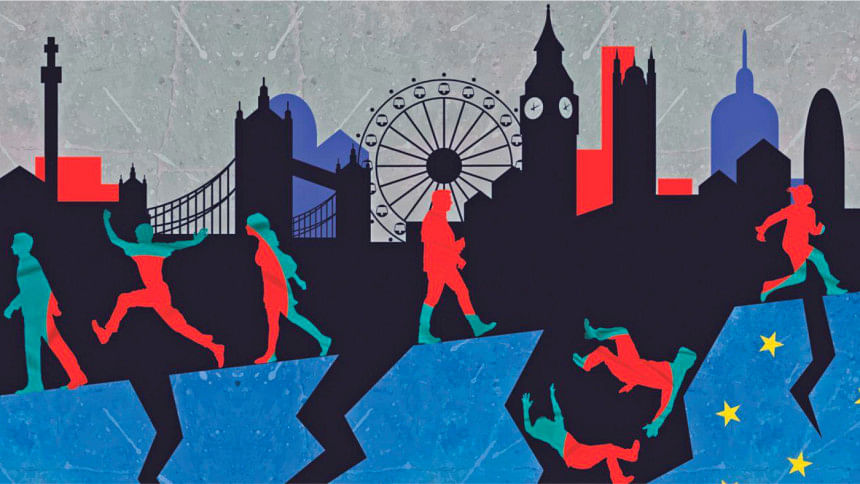Brexit for Bangladeshis

After three prime ministers, two general elections, a number of historic defeats for the government and a political deadlock that seemed like it would never end — the United Kingdom (UK) officially left the European Union (EU) on January 31, 2020, ending a 47-year relationship. The decision to leave the EU was taken in June 2016 in an extremely close referendum, where 51.9 percent voted to leave the EU and 48.1 percent chose to stay. Because of this neck-to-neck race, the following three years saw an increasingly bitter and polarised debate on the nature of the exit, or "Brexit", and whether it should occur at all, with Remainers repeatedly calling for a second referendum. The world watched with interest as Britons struggled to come to terms with this new era in their country's history, and at the turn of this year, many countries like Bangladesh, with economic ties and migrant populations within the UK, are asking the same question—what does Brexit mean for us?
The question of trade is the obvious one—the UK is the third largest export destination of Bangladesh, making up for 9.74 percent of total Bangladeshi exports during 2017-2018. During this period, goods worth almost USD 4 billion were exported to the UK from Bangladesh, with 80 percent of them being provided by the readymade garments industry. Under the Everything but Arms (EBA) arrangement with the EU, Bangladesh was able to get duty-free access to the Union market as a less-developed country (LDC). Although the UK has stated that these provisions will stand while the country is going through the process of Brexit, it is still unclear what will happen next.
The fact that Bangladesh gained eligibility for LDC graduation in March 2018 and is expected to graduate into a middle-income country by 2024 has only added to that uncertainty. While the EU has committed to making the EBA arrangement available to Bangladesh until 2027, the UK has made no such commitments. However, ex-British Prime Minister Theresa May has, on multiple occasions, stressed on the importance of strengthening economic ties with Commonwealth countries after Brexit, and on the eve of Brexit, the British High Commissioner in Bangladesh repeated how the UK is looking to explore more opportunities with Bangladesh and other non-EU countries.
These are encouraging words, but whether the UK will follow through is another question, as is whether they will have the capability of doing so, since experts have been forecasting a struggling economy for Brexit Britain for some time now. This is definitely a cause of concern for Bangladesh, since Bangladeshi exports to the UK are extremely price sensitive and any change in the British pound can affect these trade relations. This was evident in the aftermath of the EU referendum, when the UK saw a hugely weakened pound and a 7.1 percent fall in exports for Bangladesh in July 2016, as well as the negative growth of exports from fiscal year 2016-17 when compared to 2015-16.
Another obvious and more direct impact that Brexit is likely to have is on the massive British-Bangladeshi population in the UK, who in 2011 made up 0.8 percent of the population of England and Wales. A large portion of this population is concentrated in the boroughs of Tower Hamlets (32 percent Bangladeshi) —which has the largest Bangladeshi population in England—and Newham (12.5 percent Bangladeshi) in London. In Tower Hamlets, 67 percent of the borough voted to Remain, whereas 53 percent of Newham voted to Remain.
There is a rumour that Bangladeshi populations in these areas all voted to Leave. While this seems unlikely, there definitely was a sizeable part of the community who backed the Leave campaign, even if the majority didn't. This was largely due to the "Save our Curry Houses" campaign set up by then Foreign Secretary Boris Johnson and British MP Priti Patel (currently Home Secretary). Despite the fact that British Bangladeshi children, especially girls, tend to do better than other children in education, the community still suffers from a high rate of unemployment, with the average employment rate being only 57 percent and suffering from a significant gender gap. This unemployment is exacerbated by the fact that many Bangladeshis are either in low wage jobs or in the business of restaurants, which had been facing closures of "up to five restaurants a week" in 2016, according to the Bangladesh Caterers Association (BCA), due to strict immigration laws for non-EU citizens that prevented them from bringing in experienced chefs from Bangladesh.
As a result, the Leave Campaign promised the BCA, which represents approximately 150,000 members across 12,000 restaurants, to relax tier 2 immigration laws and allow more Bangladeshi immigrants into the UK once European immigration was capped. In 2016, BCA President Pasha Khandaker publicly backed the Leave campaign and told news media that it was not possible for European workers to be a part of the industry because of cultural and language differences and the inability of foreigners to deal with "the curry smell", adding "by voting to leave we can take back control of our immigration policies, save our curry houses and join the rest of the world."
Strange that the BCA identified the inability of European workers to adapt as the problem and not the rules set by the British government, which specifies that employers must provide a salary of around GBP 35,000 to secure a visa — a far higher amount than the average chef's pay. Three years down the line, the BCA have had to swallow their words. Not only has the British government refused to relax the tight controls on immigration, the fall in the value of the pound sterling has made matters worse for restaurants in the GBP four billion industry, with the Independent reporting that some restaurants claimed business to be down by almost 75 percent. In fact, when British-Bangladeshi MP Rupa Huq raised the issue in parliament, Immigration Minister Robert Goodwill dismissed the idea of bringing in chefs from Bangladesh, saying that he "lays down a challenge to the restaurateurs in our country to train our own people", despite being presented with evidence of a training college for British chefs that cost the government GBP 1.75 million to set up, but was shut down in 2012 because of a lack of applicants.
Brexit seems set to have a net negative impact on Bangladeshi employment in Britain, at least in the restaurant industry, but the repercussions for wider race relations could also be equally serious. Analysts have, on multiple occasions, called out the rhetoric coming from right-wing parties like UKIP as racist and exclusionary, heavily criticising them for creating a climate of fear about an "invasion of refugees" in the run-up to the EU referendum. In May 2019, a nationwide research by Opinium revealed that 71 percent of people from ethnic minorities reported facing discrimination, as opposed to 58 percent in January 2016. According to the Home Office, race hate crimes have also risen every year since 2013, with 78,991 incidents occurring in England and Wales in 2018/19.
Tower Hamlets is no stranger to racism. The most well-known racially motivated attack was that of Altab Ali, whose murder by three teenagers led to mass demonstrations across the Bangladeshi community in 1978. His memory is now immortalised in the name of a park in Whitechapel. The UK has gone through a lot of changes since then, and while the days of open, racial attacks on the streets may be behind them, Britain's increasingly isolationist policies and anti-immigration rhetoric in domestic politics does seem like a step in the wrong direction.
Shuprova Tasneem is a member of the editorial team,
The Daily Star.

 For all latest news, follow The Daily Star's Google News channel.
For all latest news, follow The Daily Star's Google News channel. 



Comments